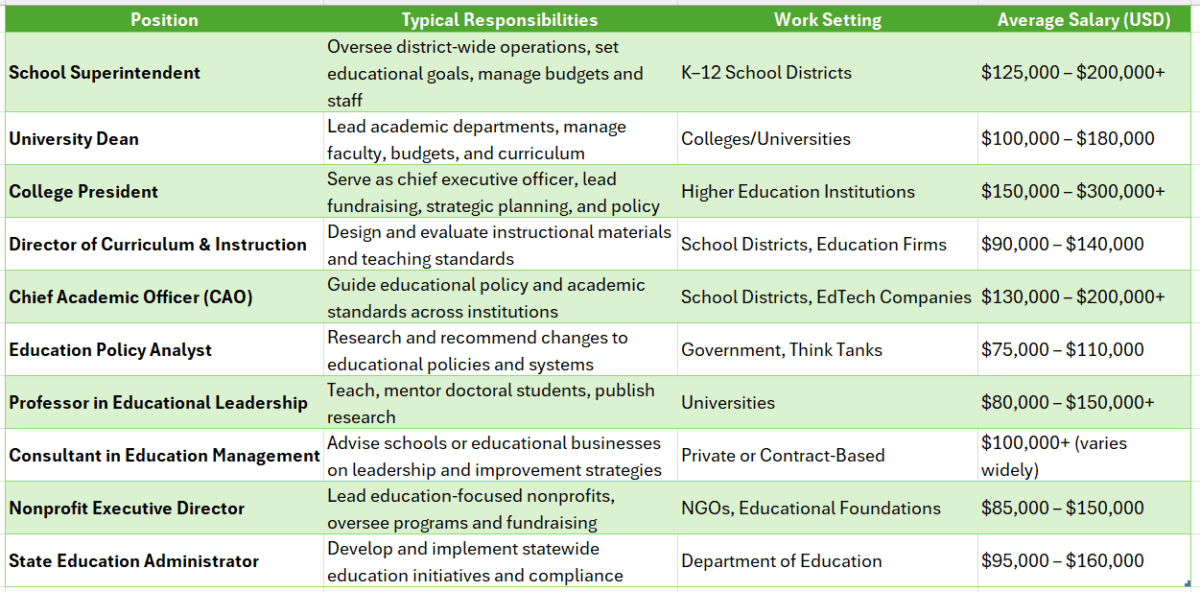
Understanding what a doctorate in education administration is can open doors to exciting career opportunities. This advanced degree equips educators with the skills needed to lead schools and educational programs effectively. Whether you’re interested in becoming a principal or a district administrator, this degree is essential for making a significant impact in the education sector.
What Does a Doctorate in Education Administration Involve?
A doctorate in education administration focuses on leadership, policy, and management within educational settings. Students learn about:
- Educational Leadership: How to inspire and guide teachers and staff.
- Policy Development: Crafting rules that shape educational environments.
- Resource Management: Efficiently using funds and materials to enhance learning.
This program is perfect for those who want to influence educational practices at a high level.
Related Doctorate Programs
If you’re exploring options, you might also consider a doctorate in special education or a doctorate in math education. Each of these degrees offers unique insights and skills tailored to specific areas of education, allowing you to specialize further and enhance your career prospects.
Study smarter, not harder—Enroll online today!
What Are the Key Components of a Doctorate in Education Administration?
Understanding what a doctorate in education administration entails is crucial for anyone considering a leadership role in education. This advanced degree not only enhances your knowledge but also opens doors to various career opportunities. So, what are the key components of a doctorate in education administration? Let’s dive in!
Core Curriculum Components
A doctorate in education administration typically includes a mix of core courses and specialized electives. Students often study topics like:
- Leadership theories
- Educational policy
- Organizational management
These subjects help develop skills necessary for effective administration in schools and educational institutions.
Specializations Available
Interestingly, this degree can also branch into specializations. For instance, a doctorate in special education focuses on strategies to support students with disabilities. Alternatively, a doctorate in math education emphasizes teaching methods and curriculum development in mathematics. Each path tailors your expertise to meet specific educational needs, making your degree even more valuable.
Why Pursue a Doctorate in Education Administration?
Pursuing a doctorate in education administration is a significant step for those looking to make a real impact in the education sector. This advanced degree not only opens doors to leadership roles but also equips you with the skills to drive change and improve educational systems. So, why should you consider this path?
Benefits of a Doctorate in Education Administration
- Leadership Opportunities: With a doctorate in education administration, you can become a principal, superintendent, or even a policy maker.
- Specialization Options: You can also explore areas like a doctorate in special education or a doctorate in math education, tailoring your studies to your interests.
- Research Skills: This degree helps you develop strong research skills, enabling you to contribute to educational practices and policies.
In summary, a doctorate in education administration is not just about earning a title; it’s about gaining the knowledge and skills to transform education. Whether you want to lead a school or influence educational policy, this degree can help you achieve your goals.
Career Opportunities After Earning a Doctorate in Education Administration

Earning a doctorate in education administration opens up a world of exciting career opportunities. This advanced degree not only enhances your knowledge but also positions you as a leader in the educational field. Whether you aspire to shape policies or improve educational systems, this degree is a stepping stone to making a significant impact.
Diverse Career Paths
After obtaining your doctorate in education administration, you can explore various roles, such as:
- School Administrator: Oversee daily operations and ensure educational standards are met.
- Policy Analyst: Influence educational policies at local or national levels.
- University Professor: Teach and mentor future educators while conducting research.
Additionally, those with a doctorate in special education can specialize further, focusing on inclusive practices. Similarly, a doctorate in math education can lead to roles that emphasize curriculum development and teaching strategies in mathematics.
Making a Difference
With a doctorate, you’re not just advancing your career; you’re also contributing to the future of education. You can lead initiatives that improve student outcomes, advocate for underrepresented groups, or innovate teaching methods. Each role allows you to leave a lasting legacy in the educational landscape.
How Does a Doctorate in Education Administration Differ from Other Doctorates?
When considering advanced education paths, understanding the differences between various doctorates is crucial. A doctorate in education administration stands out because it focuses on leadership and management within educational settings. This degree prepares individuals to tackle challenges in schools and educational organizations, making it essential for those aspiring to lead in education.
Unlike a doctorate in special education, which emphasizes teaching strategies for students with disabilities, a doctorate in education administration centers on policy, administration, and organizational leadership. This means that while special education focuses on specific teaching methods, education administration prepares leaders to manage entire educational systems.
- Focus on Leadership: A doctorate in education administration hones skills in leadership and policy-making.
- Broader Scope: It encompasses various educational levels, unlike a doctorate in math education, which is more specialized.
- Career Opportunities: Graduates can pursue roles such as school superintendents or educational consultants, impacting education on a larger scale.
What Skills Will You Gain from a Doctorate in Education Administration?
When considering a doctorate in education administration, it’s essential to understand the skills you’ll gain. This advanced degree not only prepares you for leadership roles but also equips you with tools to make a real difference in educational settings. Whether you’re interested in a doctorate in special education or a doctorate in math education, the skills you develop will be invaluable.
Leadership and Management Skills
A doctorate in education administration focuses heavily on leadership. You’ll learn how to manage teams, develop effective strategies, and inspire others. These skills are crucial whether you’re leading a school district or a specific educational program.
Research and Analytical Skills
Additionally, you’ll gain strong research and analytical skills. This means you’ll be able to assess educational programs, analyze data, and implement evidence-based practices. Such skills are vital for making informed decisions that enhance student learning and institutional effectiveness.
Communication and Advocacy
Lastly, effective communication is a key component. You’ll learn how to advocate for students and educators alike, ensuring that their voices are heard. This is particularly important in roles that involve policy-making or community engagement. Overall, a doctorate in education administration prepares you to be a change-maker in the educational landscape.
Study smarter, not harder—Enroll online today!
The Role of Research in a Doctorate in Education Administration Program
Understanding what a doctorate in education administration entails is crucial for anyone considering a career in educational leadership. This advanced degree not only prepares you for high-level positions but also emphasizes the importance of research in shaping effective educational policies and practices.
Research plays a pivotal role in a doctorate in education administration program. It helps students develop critical thinking skills and apply theoretical knowledge to real-world challenges. Here are some key aspects of research in this field:
- Informed Decision-Making: Research equips future leaders with the tools to make data-driven decisions that can improve schools and educational systems.
- Innovative Solutions: By exploring various topics, including a doctorate in special education or a doctorate in math education, students can find innovative solutions to pressing educational issues.
- Contributing to the Field: Engaging in research allows students to contribute valuable insights to the education community, enhancing their expertise and credibility.
How to Choose the Right Doctorate in Education Administration Program
Choosing the right doctorate in education administration program is a big decision. It can shape your career and influence your impact in the education field. With so many options, understanding what each program offers is crucial for your future success.
Consider Your Career Goals
Think about what you want to achieve. Are you aiming for a leadership role in a school district? Or perhaps you’re interested in specializing in areas like special education or math education? Knowing your goals will help narrow down your choices.
Program Flexibility
Look for programs that offer flexibility. Some doctorate in education administration programs allow you to study part-time or online, which can be a game-changer if you’re balancing work and family. This flexibility can make your educational journey smoother and more manageable.
Accreditation Matters
Ensure the program is accredited. This guarantees that the education you receive meets high standards. An accredited doctorate in education administration will be recognized by employers, making it easier for you to land your dream job.
How Scholarship.Education Can Support Your Journey to a Doctorate in Education Administration
Pursuing a doctorate in education administration is a significant step for those looking to lead and innovate in educational settings. This advanced degree not only deepens your understanding of educational systems but also equips you with the skills to effect change. Whether you’re interested in a doctorate in special education or a doctorate in math education, this journey can open many doors.
At Scholarship.Education, we understand that the path to a doctorate can be challenging. Here’s how we can help you:
- Expert Guidance: Our team offers personalized advice tailored to your educational goals.
- Resource Access: Gain access to a wealth of materials that cover everything from research methods to leadership strategies.
- Networking Opportunities: Connect with fellow students and professionals who share your passion for education.
Embarking on this journey means you’re not just earning a degree; you’re becoming a leader in education. With our support, you can confidently navigate the complexities of a doctorate in education administration, ensuring you’re well-prepared for a rewarding career in education.
Study smarter, not harder—Enroll online today!
FAQs
1. What is a Doctorate in Education Administration?
It’s a terminal degree focused on preparing leaders for roles in school districts, higher education, and education policy organizations.
2. What types of doctoral degrees are available in this field?
The most common are the Ed.D. (Doctor of Education) and Ph.D. in Education Administration. The Ed.D. is practice-oriented, while the Ph.D. is more research-focused.
3. Who should consider this degree?
It’s ideal for educators, school administrators, principals, superintendents, or policymakers aiming for leadership or executive roles.
4. How long does it take to complete the program?
Most programs take 3 to 5 years to complete, depending on whether you study full-time or part-time.
5. What are the admission requirements?
Typically, you need a master’s degree, professional experience in education, letters of recommendation, a resume, and sometimes GRE scores.
6. Is the program available online?
Yes, many universities offer flexible online Ed.D. and Ph.D. programs designed for working professionals.





